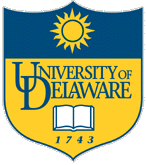
TUTORIAL METHODS OF INSTRUCTION
Syllabus - Fall 2004
1-2 Credits

|
TUTORIAL METHODS OF INSTRUCTION Syllabus - Fall 2004 1-2 Credits |
| Instructor: | Hal White | |
| Office: Phone: e-mail: |
123 Brown Laboratory
831-2908 halwhite at udel.edu |
|
Course Description: Tutorial Methods of Instruction is a course for undergraduate students who are group tutor-facilitators in courses where problem-based learning (PBL), peer-led team learning (PLTL), or other peer-facilitated learning strategies are used as a mode of instruction primarily in sciences. Students may register for one or two credits. This course has formerly been offered as CHEM-401, BISC-422 (Section 10), or special topics/independent study in various departments. This course is being offered as part of the University of Delaware's Undergraduate Science Education Grant from the Howard Hughes Medical Institute (HHMI).
Time & Place: The first class, a two-hour orientation session before classes start, will be held on Monday, August 30th from 2:00 to 4:00 p.m. in 109 Memorial Hall. Thereafter enrolled students will meet either from 12:00 - 2:00 p.m. Mondays in 206 Alison Hall West or 4:00 - 6:00 p.m. in 109 Memorial Hall. In order to gain practical experience, you will serve as a tutor-facilitator in a PBL or PLTL courses on campus, and meet on a regular basis with the instructor of that course for more specific content preparation.
Pedagogical Philosophy: Learning, according to the constructivist view, requires active involvement of the learner in an environment where new information can be integrated with prior knowledge and experience. It recognizes the uniqueness of each person’s understanding and the impossibility that a learner’s construction of knowledge will replicate in every detail that of the instructor. Too often in education, the ability to remember and reproduce information has been confused with understanding.
A constructivist philosophy underlies the problem-based approach to learning. Problem-based learning (PBL) was formalized in medical school education where students in small groups learned basic concepts in the context of a real problem (a medical case study) under the supervision of a faculty tutor. Starting in 1992 several professors at the University of Delaware, including the instructors of this course, began to adopt and adapt PBL for undergraduate instruction in both introductory and advanced courses in a number of disciplines. Due to the larger class sizes, these instructors were unable to dedicate their entire efforts towards working with one small group, as is the case in the medical school setting. Some solutions for this dilemma have been for the course instructors to serve as roving tutor-facilitators who spend part of each class with each group, or to enlist the assistance of talented undergraduate peer tutor-facilitators. This latter solution (or a combination of the two) has been particularly effective, from the viewpoint of students, tutor-facilitators, and instructors.
As this strategy has become more popular at the University of Delaware, the instructors using it have joined together to bring their diverse perspectives and experiences to help peer tutor-facilitators learn the needed skills and to support their efforts in the classroom. The result is the course Tutorial Methods of Instruction, which as indicated by the title, will focus on inquiry- and group-based methods of teaching and learning. Students enrolled in the course will learn how to assist the learning of other students through questioning methods that promote thinking and discussion, through establishing and maintaining positive group dynamics, and by introducing students to new resources. The course is designed to familiarize tutor-facilitators with general methods that should work in any classroom, and are not confined to a particular discipline. While tutor-facilitators should be reasonably knowledgeable in the subject in which they assist, and must understand and be familiar with the material in a particular course, they need not be content experts in the subject to be effective. [Tutor-facilitators in the local news and HHMI news.]
Current or former students in Tutorial Methods of Instruction have served as tutor-facilitators in the following courses:
BISC-207, Introductory Biology
I (Dr. Allen, Dr. Donham,
and Dr. Dion)
BISC-208, Introductory Biology
II (Dr. Allen, Dr. Dion)
CHEM-101 General Chemistry-PLTL
(Dr. Wingrave)
BISC-472, Principles of Infectious Disease (Dr. Noble-Harvey)
CHEM-342, Introduction
to Biochemistry (Dr. White)
CHEM-647, Biochemical
Evolution (Dr. White)
EDUC-335, Elementary Curriculum-Mathematics
(Dr. Morris)
GEOL-105, General Geology
(Dr. Thompson)
NURS-212, Pathophysiological
Concepts (Dr. Cannon)
PHIL-241,
Ethical issues in Health Care (Dr. Durbin)
PHIL-246, Philosophical Perspectives
of Medicine (Dr. Durbin)
PHYS-201,
Fundamentals of Physics I (Dr. Williams)
PHYS-202, Fundamentals of
Physics II (Dr.
Williams)
POSC-105,
The American Political System (Dr. Pika)
SCEN-102, Physical Science
and Technology (Dr.
Shipman)
Roles
and Responsibilities of Tutors:
For
theTutorial Methods course
General responsibilities in the course in which you will tutor
For the peer tutors: The experience allows them to help other students in a formal way. For tutors who may be interested in a career in teaching, it provides an opportunity to experience the role of teacher using some of the educational approaches that are likely to continue to be important. It also will be a multidimensional learning experience (helping others to learn as you learn). There is no better way to really learn a subject than to teach it.
For the instructors: It allows instructors to explore ways to improve the learning of all students, both tutors and course registrants. It requires them to think of the more global issues involved in teaching and learning - i.e., those that transcend "coverage" of the content matter of a discipline. It helps them maintain enthusiasm for teaching by providing an intellectually stimulating pedagogical challenge.
Acknowledgements:
Support for this course and its students
comes in part from the Howard Hughes Medical Institute's (HHMI) Undergraduate
Science Education Program.